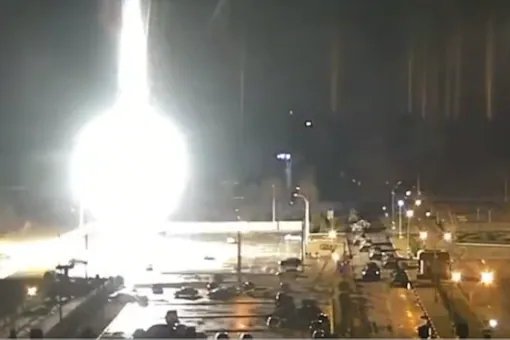After an intense firefight, Russian forces took control of a nuclear power plant in Zaporizhzhia, Ukraine on Friday morning. International observers were aghast at the brazen attack on an extremely sensitize site and feared it could trigger a major catastrophe. However, nuclear watchdogs in several different countries say the plant’s reactors weren’t impacted and there’s been no sign of radiation spikes.
During the assault, a Russian projectile struck a training building at the facility, causing a large fire. Reuters reports:
A video from the plant verified by Reuters showed one building aflame and a volley of incoming shells before a large incandescent ball lit up the sky, exploding beside a car park and sending smoke billowing across the compound.
Ukrainian fire fighters were initially unable to respond because Russian troops were shooting at them, according to a plant spokesman. After raging for five hours, the fire was eventually extinguished.
“Ukrainian officials have said Russian troops took control of the overall site, but the plant’s staff were continuing to ensure its operations,” according to The Associated Press.
Many uncertainties swirl around the status of the nuclear facility, which is the largest in Europe and provides Ukraine with about 25% of its power.
Dmytro Orlov, the mayor of the closest city, Enerhodar, released a statement Friday morning that was likely made at gunpoint, claiming, incredibly, that Russian forces were firing blanks during the attack.
“We call the population not to provoke the troops of the Russian armed forces,” he said.
The Washington Post reports:
Ukraine’s national atomic energy company Energoatom said in a post on its official Telegram account that Orlov’s statement appeared to have been made under duress. “There is a high probability that the recent speech of the mayor of Enerhodar was recorded under the barrel of a machine gun,” the post reads.
Energoatom said similar videos may appear from other officials “detained by the occupiers,” and it urged caution and vigilance.
The New York Times adds:
The potential for catastrophe had set off alarm bells among world leaders. As the fire raged, President Biden and Prime Minister Boris Johnson of Britain spoke with President Volodymyr Zelensky of Ukraine, with all calling for an urgent halt to the Russian advance on the complex. Mr. Johnson said he would seek an emergency meeting of the United Nations Security Council.
The Russian defense ministry blamed Ukrainian saboteurs for threatening the plant, saying that Russian forces had taken control of the facility to foil a “monstrous provocation” by the Ukrainian government.
The Post provides additional context:
Jon B. Wolfsthal, a former adviser to Biden when he was vice president, said in an interview on Twitter that the reactor models built at the Zaporizhzhia plant were safer and better protected than the Chernobyl reactors.
“It’s not as dangerous as Chernobyl, but tank fire and nuclear reactors are never a good combination,” he said. He said key questions were whether there was any damage to the water pumps used to cool the reactors, whether the connection to the grid had been cut and whether transmission lines were intact.
“War is unpredictable and can lead in different directions. And when you have nuclear powers at play, it is even more unpredictable,” Wolfsthal said.



